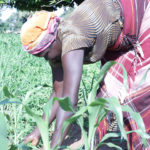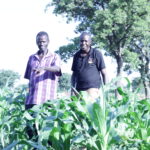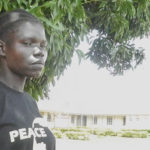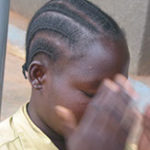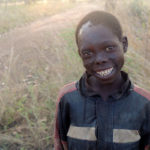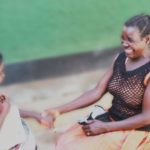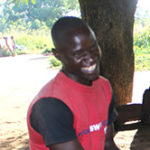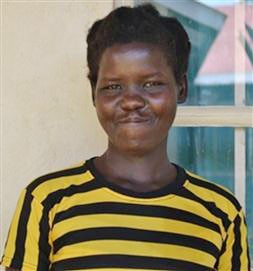Youth Leadership promoting peaceful conflict resolution
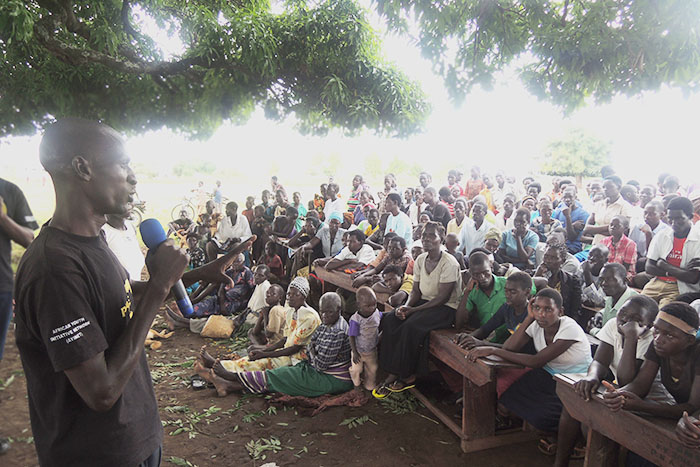
Twenty-six year old Okeng Martin, a resident of Ngetta Subcounty, Lira District, dropped out of school in lower primary due to the the LRA insurgencies. He feared being killed like his parents or abducted like his relatives. As the eldest in his family, at 13 years, he took up the responsibilities of taking care of his younger brother and three sisters. He explains, “I hustled to make ends meet. I would walk to and from town a distance of about 10kms hawking roasted g-nuts and managed to see my siblings through till they all joined vocational school.
It was through this ordeal that he realized he had inborn leadership and problem-solving skills. He always took time off to attend community meetings, dialogues, and mediations, but he couldn’t find a way to become more involved: “I always wanted to participate but I didn’t have the confidence.”In 2014, he joined an AYINET-trained youth group in his community.
“I was amazed at the way the youth conducted their activities, mediated conflict, had the confidence to speak in a public forum, and also trained other youth. From then I felt a sense of belonging in that youth group and with my already inborn skills of leadership and problem-solving, I felt I was in the right place and doing the right thing.” he said.
In April 2015, there was a land wrangle in Okeng’s neighborhood that had taken years. Though the local council land committee, religious leaders, and clan chief attempted to intervene through community dialogues, Okeng explains that they “always ended violently with drunkard youth from both sides holding stones, pangas, and sticks in their hands and using obscene languages, therefore disorganizing the mediation process. To them, confrontation and use of force was the only solution to the problem.”Witnessing the confrontation, he became interested in ending this chaos and reconciling the two parties with his newly acquired skills in conflict mitigation.
Okeng endeavored to be inclusive and listen to both parties. As he explains, “I realized the problem was complex, as both parties were to blame, the mediators had taken sides, the youth were bribed with alcohol to cause violence, the environment was not friendly enough for problem solving, and the boundary demarcation that caused conflict was not clear.” He therefore arranged a private meeting for the two conflicting persons together with few witnesses like the LCI, community and religious leaders. Okeng took lead in the mediation process using dialogue and negotiation that he had learned from his time with the youth group, and he solved the problem. The conflict ended with acknowledgment of the original boundary, reconciliation, and planting of trees locally known as “omara omara” to demarcate the boundaries.
After successfully resolving the land conflict, he thought of taking part in more leadership opportunities. He registered in one of the political parties for the post of LC1 of his village. As he says, “The people in my community had their trust in me, and they supported me. I almost got through in Primary elections but lost by three votes. This encouraged me to move on and aim higher in my leadership career despite my poor education background.” Okeng received tremendous support, even though he had no experience in being a political leader. he won the trust of his community through his leadership , problem-solving skills and qualities. “I’m grateful to AYINET for empowering me and paving way for my new beginning.”
Through AYINET’s youth program funded by USAID’s SAFE program, (Supporting Access to Justice, Fostering Equality and Peace). AYINET conducts community and school outreaches, radio talk shows, youth leadership and peace building trainings, established youth groups, supports community conflict mitigatiors. These activities drive towards engaging and empowering youth as responsible and peaceful leaders within their communities as this shows youth involvement in leadership, reconciling conflicting communities, crime reduction and above all youth participation in peaceful electoral process within their communities.



